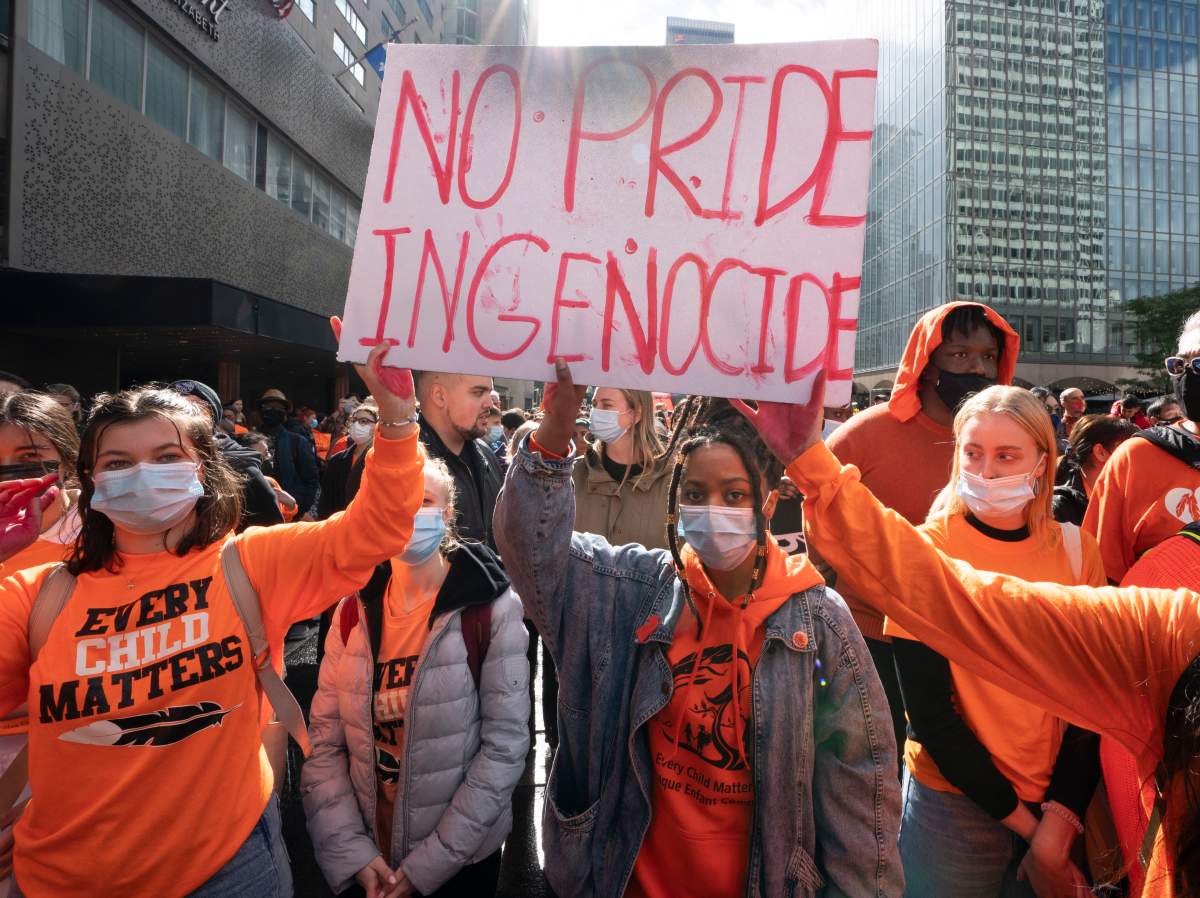Indigenous leaders are calling for more to be done in Quebec as the country marked its first National Day for Truth and Reconciliation to honour lost children and survivors of residential schools.

A march organized by the Native Women’s Shelter and the Assembly of First Nations Quebec-Labrador got underway at 1 p.m. in Montreal, where a sea of people donning orange shirts made their way through the city. Some held up signs saying “No pride in genocide” and “Every child matters.”
“For me it’s very important for Indigenous peoples’ voices to be heard,” said Eva Angiyou at the march.
“I’m newly reconnecting with my roots because my mom was a residential school survivor. It’s very important for me to get back with my community.”
Nakuset, the executive director of the shelter, explained the newly created statutory holiday isn’t a celebration but a day of mourning for what Indigenous children and their families were subjected to and endured in Canada.
“We need action. We need justice,” she said. “And we need a lot of really positive change and that’s what today is about.”
What can Montrealers do to show their support for Indigenous communities? Nakuset encouraged those who could to show up to the Every Child Matters march.
“I really am asking for the youth to show up, too, because they really are our future leaders,” she said.

The National Day for Truth and Reconciliation has not yet been officially recognized by the Quebec government. It is one of the 94 calls to action from the Truth and Reconciliation Commission.
The recent discoveries of thousands of unmarked graves at former residential school sites around Canada have pressured governments across Canada to tackle Indigenous issues and have renewed calls for action. But Quebec Premier François Legault in June decided against officially recognizing the day, stating the province had enough statutory holidays.

Get breaking National news
Legault stood by his decision Thursday. He said he does not intend to make Sept. 30 a public holiday because “we need more productivity” despite a motion put forth by Québec solidaire and supported by opposition parties to recognize the day.

Later in the day, Legault told reporters it would be too expensive to give Quebecers another paid day off work.
The premier said Quebecers have a duty to remember how residential schools damaged Indigenous communities, but he says there are less costly ways to commemorate the past.
“To have another statutory holiday — regardless of the subject — is very expensive,” Legault said. “I don’t think it’s necessary to have a cost this high to do this commemoration.”
The Quebec government’s refusal to acknowledge systemic racism in the province has also been roundly criticized. The government has also not yet adopted Joyce’s Principle, which calls for a recognition of systemic racism.
The principle was created in honour of Joyce Echaquan, an Atikamekw mother of seven who died a year ago. She was subjected to taunts from health-care staff as she lay dying in a Joliette hospital.
Ghislain Picard, the chief of the Assembly of First Nations Quebec-Labrador, said the principle should be accepted as a whole — and that not doing so is an example of a “pick-and-choose position” by the government.
“The reality is the government is choosing to isolate itself because systemic racism is the basis for a nationwide consensus and even beyond, I would say,” he said.
The Indian Residential Schools Crisis Line (1-866-925-4419) is available 24 hours a day for anyone experiencing pain or distress as a result of their residential school experience.

—with files from Global News’ Raquel Fletcher, Saba Aziz and The Canadian Press









Comments